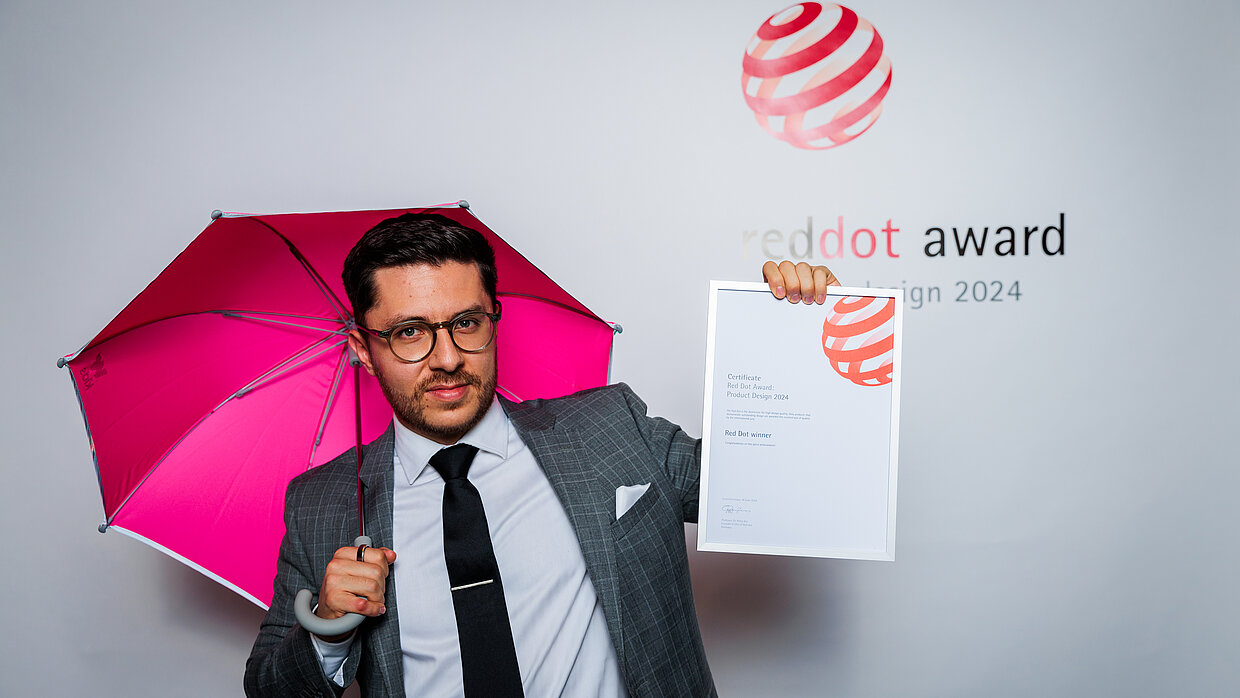
On the Young Professionals Application Day, Red Dot is giving away 50 free registration places for the Red Dot Award:…

Oto is an intelligent otoscope that uses an integrated AI camera to enable more accurate ear examinations and support healthcare professionals in making diagnoses. It makes it easier to store data in electronic health records and promotes collaborative diagnosis through image sharing. The design combines comfort, control and precision.
Oto’s designer Joe Slatter talks about the philosophy and challenges of designing medical devices. He shares his views on Oto’s key design elements, the influence of medical professionals on the project, and his excitement about the Red Dot Design Museum Essen.
Red Dot: What philosophies do you embrace when designing a project like Oto, which was awarded a Red Dot?
Joe Slatter: I tend to adopt a problem-first mindset, where I identify the project’s “enemies” (the core challenges that need to be addressed). These can range from broad issues, like Oto’s primary focus on tackling inaccurate ear infection diagnoses and the subsequent impact on antibiotic resistance, to more granular obstacles such as incorrect handling of the device or difficulties in uploading observations onto patient notes. By breaking the problems down into smaller components, I’m able to think broadly about the solutions rather than rushing into preconceived design outcomes.
What part of your design do you take the most pride in or what makes it particularly meaningful to you?
With Oto in particular as a project, I take immense pride in knowing that the design has the potential to make a tangible impact on people’s health and wellbeing. When working on medical projects, the motivation comes from knowing that the solutions we create can genuinely improve lives and perhaps even my own or those of loved ones if they were to encounter the device in a healthcare setting in the future.
Were there any breakthrough moments that shaped your project?
About halfway through the design process, the project experienced a significant turning point in terms of its form and the industrial design. Initially, exploration involved an entirely new shape and grip for the otoscope, creating a different way for users to hold it. Taking foam models of these early concepts to Queen’s Hospital, Nottingham, for feedback from ENT nurses and doctors completely shifted the project direction. Their response was pivotal; they preferred a design that felt familiar to use from those they were trained with. From that moment, the focus was shifted towards refining a more traditional form, enhancing it ergonomically for improved weight distribution and micro-control when examining the ear.
Did you have any mentors or peers who helped guide your vision or challenge your ideas?
Throughout the project, healthcare professionals played a critical role in shaping the design and challenging my concepts. From in-person interviews and prototype reviews to phone consultations and online surveys with healthcare professionals internationally, their feedback was instrumental at every stage. The ongoing dialogue ensured that the design evolved to meet real-world clinical needs. Their insights, particularly around ergonomics, usability, and functionality, were invaluable in refining the device’s form.
As a young professional, how do you stay current with design trends while ensuring that your work stands out as innovative and unique?
I believe it’s crucial to observe design trends not as something to follow, but rather as a broader reference point to the direction society is moving and expects. Over-reliance on replicating design trends can lead to work that quickly feels dated. Instead, I focus on gathering inspiration from other industries such as music, advertisement and current affairs in general.
What kind of projects or industries excite you for the future?
I’m excited by the potential for hyper-personalised products that respond to the way consumers are fed and expect tailored content digitally these days. As digital experiences become increasingly customised, I believe this trend will influence physical products as well. The future of design could see items in our homes being crafted for niche audiences, with a focus on personal expression.
How has participating in the Red Dot Award: Product Design influenced your career as a young professional?
Participating in the Red Dot Award has been an honour, especially going through the Young Professionals' program, it levels the playing field between emerging designers like myself and established international companies.
What were your thoughts on the Red Dot Design Museum when you came for the award ceremony?
I was incredibly impressed by the care and attention to detail that had gone in behind the scenes of all the products on display in the museum. This was my first visit, and in contrast to other large design expos where I often feel overwhelmed by the consumerist need to produce more and more stuff, the atmosphere at the Red Dot Museum left me feeling uplifted and inspired. It was clear that the large number of design teams that had invested significant time, effort, and attention into each product was fantastic to see.
On this day, young entrepreneurs and designers who have graduated within the last five years have the chance to win one of 50 free entries for the Red Dot Award: Product Design. The products of the selected talents will be evaluated by the Red Dot Jury together with those of all the other participants. In the event of being awarded, the young talents benefit free of charge from the extensive services provided for Red Dot winners that communicate their success in the competition internationally. For further information, please click here.